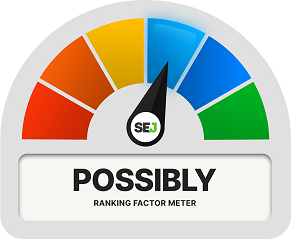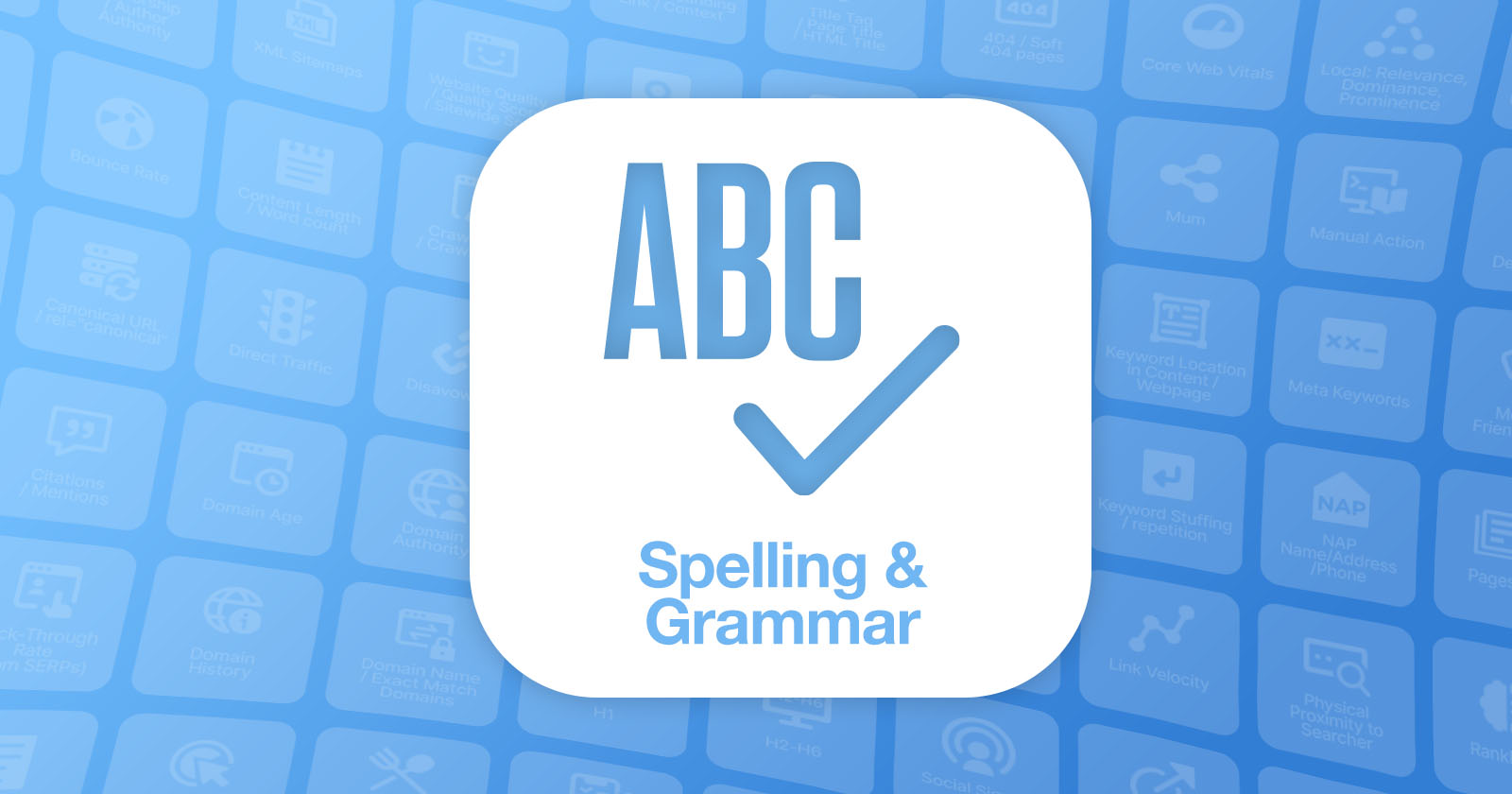While most professionals strive to write the highest quality content possible, spelling and grammatical mistakes happen.
But what happens when you publish those mistakes? Will search engines be less likely to rank you higher in search results thanks to those mistakes?
The Claim: Spelling & Grammar As Ranking Factors
Understandably, many marketing professionals see spelling and grammar as possible ranking factors. After all, one of the things often repeated by Google is to avoid publishing low-quality content.
For example, Google’s Advanced SEO guide for bloggers states, “A useful post once a week is better than low-quality content published daily.”
In an article on how to create high-quality websites, the Google Search Central Blog specifies:
“One other specific piece of guidance we’ve offered is that low-quality content on some parts of a website can impact the whole site’s rankings, and thus removing low quality pages, merging or improving the content of individual shallow pages into more useful pages, or moving low quality pages to a different domain could eventually help the rankings of your higher-quality content.”
Google’s SEO Starter Guide suggests that you avoid “writing sloppy text with many spelling and grammatical mistakes.”
The Search Quality Rating Guidelines describe low-quality content as follows.
“This content has many problems: inaccurate/meaningless information and complete lack of editing with poor spelling and grammar—both of these characteristics in combination justify the Lowest+ to Low rating.”
Google also released a post about spelling and search queries, noting that:
“Thanks to advancements in deep learning, we now have a better way to understand spelling. Late last year, we announced a new spelling algorithm that uses a deep neural net that better models and learns from less-common and unique spelling mistakes. This advancement enables us to run a model with more than 680 million parameters in under two milliseconds — a very large model that works faster than the flap of a hummingbird’s wings — so people can search uninterrupted by their own spelling errors.”
In other words, Google’s algorithm knows how to handle misspellings.
[Deep Dive:] The Complete Guide To Google Ranking Factors
Spelling & Grammar As Ranking Factors: The Evidence
In 2011, Matt Cutts, head of Google’s webspam team, was asked if spelling and grammar matter when evaluating content and site quality. He begins by saying that since the last time he checked, spelling and grammar were not direct ranking signals.
Cutts says that throughout various tests, Google has determined that websites with better spelling and grammar are more reputable.
Cutts ultimately suggests that content should provide a good user experience regardless of the effect on search rankings.
A month later, Cutts answered another question about spelling and grammar on whether blog owners should edit blog comments or not approve poorly-written comments to protect the site’s quality.
He notes that there are nonsensical comments on sites like YouTube, but that doesn’t stop YouTube from ranking the videos properly. The key is to ensure that your content is high quality.
In 2017, John Mueller, Search Advocate for Google, was asked if grammar affects SEO. Mueller says it doesn’t affect search engines, but it does make an impression on your users, which is more important.
In 2021, Mueller answered whether Google’s search algorithms check for broken HTML, spelling, or grammatical mistakes.
Mueller said he considers spelling and grammar a gray area. It affects SEO because if crawlers can’t determine what the page is about, it can’t be indexed appropriately.
He notes that Google aims to serve high-quality content to search users, and content with spelling and grammatical errors tends to appear more low-quality.
He concludes that most websites should be more concerned with spelling and grammar mistakes than they should be concerned with broken HTML (unless the HTML is so broken that crawlers can’t properly understand it).
Should You Care About Spelling & Grammar In SEO?
Cutts and Mueller agreed that spelling and grammar could affect user experience regardless of Google rankings.
Even if you provide good information and services, you will have difficulty converting searchers if your webpage contains errors.
Also, it’s important to note that spelling and grammar matter to other search engines.
In 2014, Bing’s Sr. Product Manager Duane Forrester published a blog post on quality. After discussing common errors on the web, he ends the post with the following:
“This might all seem a bit ‘down in the weeds’, but just as you’re judging others’ writing, so the engines judge yours. If you struggle to get past typos, why would an engine show a page of content with errors higher in the rankings when other pages of error free content exist to serve the searcher? Like it or not, we’re judged by the quality of the results we show. So we are constantly watching the quality of the content we see.”
That explanation aligns with Bing’s Webmaster Guidelines, which include the following section about quality and credibility.
“Determining the quality and credibility (QC) of a website includes evaluating the clarity of purpose of the site, its usability, and presentation. QC also consists of an evaluation of the page’s authoritativeness, which includes such factors as the author’s or site’s reputation, the level of discourse (for example, an article with citations and references to data sources is considered higher quality than one that does not explain or cite it’s data sources; pages that call for violence, name-calling, offensive statements, or use derogatory language to make a point are generally considered low quality), the completeness of the content, and transparency of authorship.”
While it doesn’t specifically address spelling and grammar, it does suggest that Bing uses a system similar to Google’s Search Quality Rating Program to ensure it delivers quality results to its search engine users.
Bing News also has specific criteria when choosing content for PubHub. It includes the following:
“Content containing correct grammar and spelling and that keeps site design easy for people to navigate. Advertising should never interfere with the site experience.”
[Discover:] More Google Ranking Factor Insights
Our Verdict: Spelling And Grammar May Not Be Direct Google Ranking Factors, But They’re Still Very Important

Spelling and grammar are not direct Google ranking factors. However:
- They are important signals to users of your website about its quality, and you should care more about that than whether the algorithm counts them.
- Google is not the only search engine, and they might be ranking factors for other search engines.
A perfect editing job may not impact your rankings in Google search, but it can help with other search engines and improve your conversions from search traffic. There’s also a correlation between good spelling and grammar and good performance in search.
Therefore, it would be wise to work with an editor or use readability tools like Grammarly to check your website content for spelling, grammar, and readability issues.
While a perfect performance score on Grammarly won’t ensure the number one ranking for your target keyword, it can help provide a better user experience. And that makes it worth the investment, regardless of the SEO benefits.
Featured Image: Paulo Bobita/Search Engine Journal
![Ranking Factors: Fact Or Fiction? Let’s Bust Some Myths! [Ebook]](https://cdn.searchenginejournal.com/wp-content/uploads/2022/08/rf-ebook-download-banner-62e8c6126ffe8-sej.jpg)
